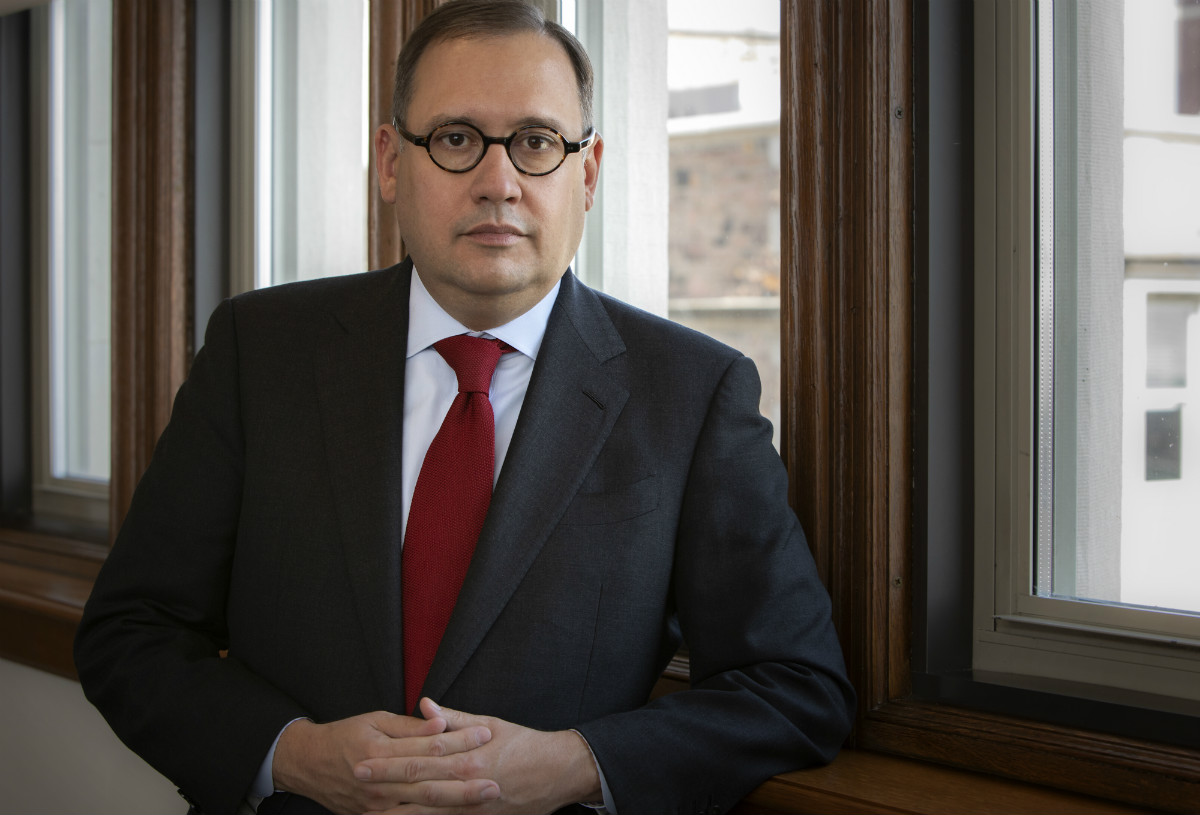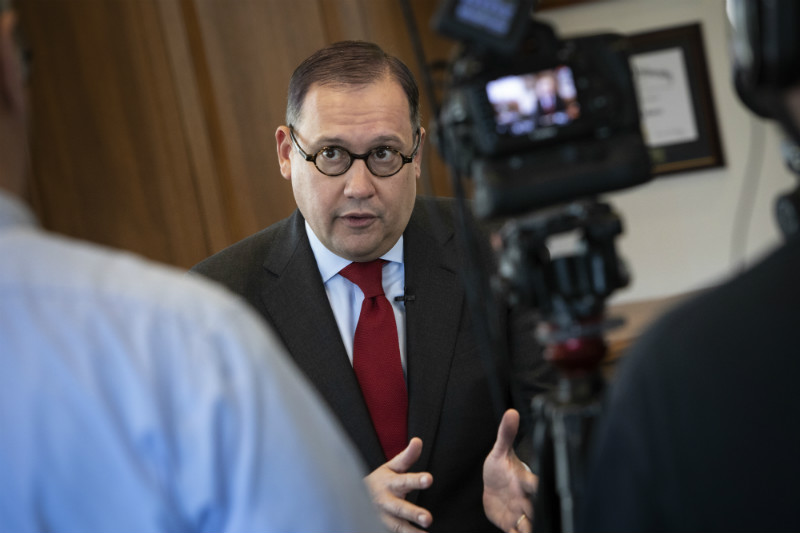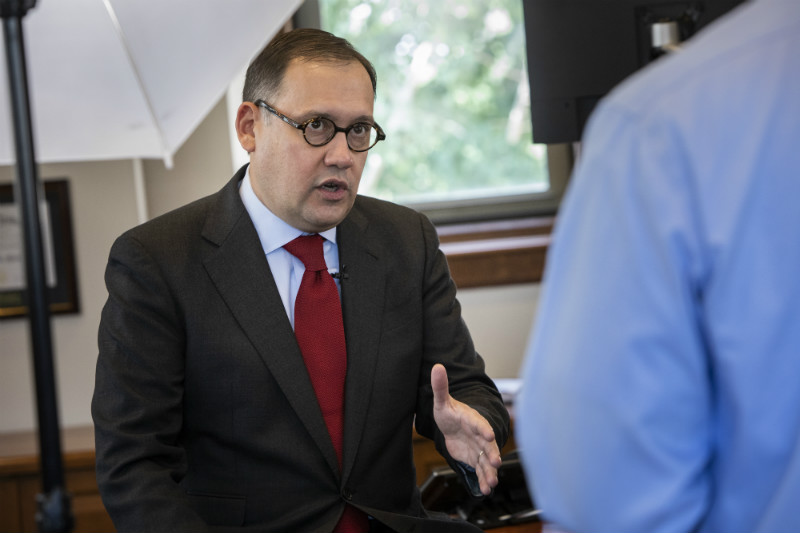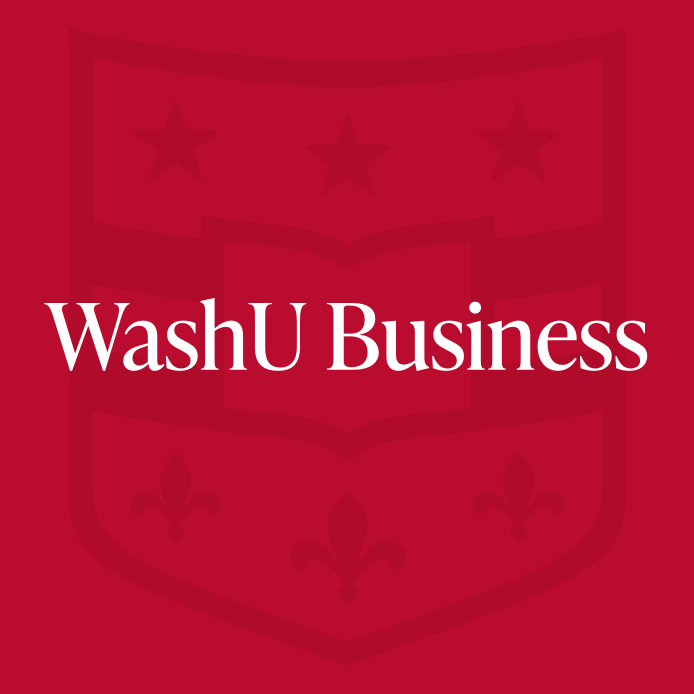Talking business with WashU’s new chancellor
- September 26, 2019
- By WashU Olin Business School
- 11 minute read

Updated October 3, 2019: Our interview with Chancellor Martin was quite a few weeks before today’s inauguration. Here is what he had to say in his inaugural address.
“Tomorrow, we’ll be in The New York Times,” Washington University’s 15thChancellor Andrew D. Martin told us as we stepped into his office. He was eagerly awaiting a batch of US Supreme Court decisions so he could crunch numbers for his ongoing research on judicial decision-making. Martin had agreed to spend a few minutes with Olin Business so he could introduce himself to Olin’s alumni.
The week of our conversation, the newest class of full-time MBA students arrived at Olin, launching the school’s rebooted program with a ’round-the-world immersion in global business. The day they arrived, Martin shared a blog post about the intrinsic value of WashU’s globally diverse community.
Our conversation took place a few months shy of his October 3, 2019, inauguration. The office where former chancellors Bill Danforth and Mark Wrighton once sat has quickly become his own, surrounded by bobbleheads and signed baseballs belying his love of the St. Louis Cardinals. Martin spoke about his hopes for the university, his philosophy on business education and his wide-ranging academic background.
Olin Business: You returned to WashU after five years away. What were some of the first things you wanted to do when you got back?
Andrew D. Martin: Oh, I wanted to stop by my old neighborhood, you know? We used to live in Ames Place near the University City Loop. We also walked back to The Loop as a family to visit some of the places where we liked to go—Blueberry Hill, Froyo, those sorts of places. That was really terrific.
OB: One of our strategic pillars at Olin centers on this idea of preparing decision-makers who can change the world, for good. Is there a story or anecdote you can talk about that speaks to that kind of decision-making in your experience?
ADM: One of my biggest responsibilities as chancellor is to make myriad complex and, at times, difficult decisions about our path forward as a university. Of course, when you have all the data, decisions are pretty easy. But most of the decisions we need to make are going to take place during times of uncertainty. And, so, thinking about how to use one’s principles—the appropriate inferential apparatus to get to the right values-based decision—can be really difficult, especially when you have uncertainty. It’s one of the things I do regularly, perhaps even on a daily basis.
OB: Do you have some sort of framework that you’ve used or is it just something that comes with experience over time.
ADM: Well, I’m a data guy. And so, for any decision, in any context, it’s really important to me to have as much data as we can possibly have and to fill in any gaps we might have. But, at the end of the day, when I think about making difficult decisions, I always lead with mission. What are the university’s central principles and values? When I think about Washington University, our mission can be broken down into three parts—we’re about education, we’re about research, and we’re about patient care.
And so, for any decision I’m considering—employment practices, benefits, a construction project or anything else—I want to think about it through that missional lens and whether going down one path or another will better serve our mission.
OB: What made you throw your hat into the ring for the position of chancellor?
ADM: It’s a great job at a great university in a city that I’ve come to love. In some ways, I feel like I’ve grown up in St. Louis. I was here for four years as a graduate student in the mid-1990s. After that, I was away teaching at Stony Brook University for just a couple of years, and then I came right back! I grew up from a new assistant professor all the way to an endowed chair with various leadership responsibilities here. And so, for me, the opportunity to come back to St. Louis and to serve this institution was just a total no-brainer.
OB: We noted your blog post about the intrinsic value of our international population, accounting for 22% of WashU students. As you know, Olin this week launched our restructured global MBA. Can you speak about the value of global education going the other way—into and around the world—and the challenges in this geopolitical environment?
ADM: Absolutely. I think about this in two different ways. One has to do with talent. We’re in the business of bringing the most talented people to this university. That’s true for our faculty, our students and for our staff. And, of course, we’re in a global market for talent. To that end, to put up barriers as an institution and as a country that try to keep the most talented people from coming here—I view that as a significant problem, which served as the motivation for the blog post.
At the same time, particularly as we think about our educational mission, it’s crucial for us to prepare all our students—no matter their background—to work in the global workforce. Most of our graduates are not going to have a singular career. They’re going to have a series of careers. And, in almost any industry, they’re going to interact with people from around the world. It’s certainly the case in higher education, and it’s the case in every other sector as well.
OB: Have you had much opportunity to interact with Olin alums? What feedback are you hearing?
ADM: So far, I’ve had the opportunity to meet with many Olin alums around the country. I look forward to meeting more alums around the world later this calendar year. I think our alumni are really excited about the university and about the role Olin plays, both on our campus as well as regionally, nationally and internationally. Of course, the undergraduate program is simply outstanding. It’s serving our students very well and creating exceptional opportunities for them professionally down the road. Our graduate and professional programs have recently been reimagined by Dean Taylor. I think the path we’re on is a very promising one. We’ll see how things progress in a very dynamic environment—particularly in business education.
Overall, I think we’re very well positioned, and there’s a lot of excitement among the alumni with whom I’ve spoken.
—Chancellor Andrew D. Martin
OB: Olin alumni would be interested in your vision about how you see the university moving forward and how Olin fits into that vision. Is there anything you can share right now?
ADM: I’m holding my powder until my inauguration in October. Although the things that I’m going to talk a lot about have to do with getting back to our mission. What are we doing in our research programs? How can we enhance our educational programs? I’m also going to talk a lot about our connection to the city of St. Louis. We are a university founded by the St. Louis business community over 150 years ago as well as a university that serves St. Louis today in so many ways—but I think we could be doing even more.
OB: We wanted to ask about the university’s strategic planning process. What do your instincts tell you about where we should be going or how WashU’s schools will be integrated into that plan?
ADM: If you look at our seven schools and colleges, each of them is at different points in a strategic planning process. Of course, Olin has been through that process and is now executing on its plan. As we think about a strategic plan for the university, I think it’s very important for us to honor the plans of the individual units. It’s also important that we support those schools and colleges that are in the midst of a planning process right now. At the same time, we need to involve all of the stakeholders on our campus when it comes to big, cross-cutting initiatives, which I think are going to be crucial for us to continue to drive forward.
OB: Are there any rules of business that you’ve picked up along the way? Any tenets you live by? You mentioned focusing on mission; anything beyond that?
ADM: Washington University is a huge organization. We’re the third largest employer in the St. Louis region. I’ve had to learn a lot about business operations over time.
For me, as I think about decision-making, I think about mission, I think about data, and putting those two things together to help us get to the very best spot.
—Chancellor Andrew D. Martin
I don’t mind taking risks, but I think it’s important for those risks to be well-calculated and to fully understand what the downside of those risks are.
In addition, one of my primary roles as chancellor is to be a steward. We have amazing resources at this university, and part of my job is to steward those resources so they continue to grow and support the institution going forward, but not inhibit us from accelerating as quickly as we might.
OB: One of Olin’s key initiatives is working across the campus with other schools and colleges on cross-disciplinary miners and majors. This year, we’re launching a minor in the business of the arts with the Sam Fox School. Are these important initiatives to you?
ADM: Absolutely. As we’re preparing students in a very, very dynamic global political economy, it’s important for us to leverage all of the assets we have on the campus to best prepare students. There are numerous outstanding professional opportunities for students in the arts. At the same time, we offer exceptional training at the Sam Fox School as well as exceptional training at Olin. So, bringing those things together, both in a curricular way and in terms of research, is really important.
Our schools do very, very good work standing by themselves. They can do even better work and add to their portfolio if they’re collaborating with others.
—Chancellor Andrew D. Martin
OB: You mentioned you don’t have a business school background. Has your career brought you to an appreciation of business school in ways that perhaps you didn’t have years ago?
ADM: Oh, definitely. I wish I would have taken on accounting when I was an undergraduate, for example. Business school provides a wonderful set of skills and a wonderful set of lenses that are not just applicable to business, but applicable across nonprofit space and other types of leadership opportunities as well. And so, for students interested in that type of more practical training, I think business school is terrific.
OB: You also don’t have a law degree and yet you were a faculty member and leader in the WashU law school. Can you help us square that circle?
ADM: Sure. So, my academic work is in two fields. One is what we call political methodology, or what we call “data science” today. The other half is in a field called “judicial politics,” which is—in my case—using data and statistics to study how judges make decisions. I’ve done a lot of work on the US Supreme Court and continue to do a little bit of analysis here and there. In fact, I’m planning to do some analysis today as soon as the last set of decisions come down.
My research has focused on those areas. And early on in my faculty days here at Washington University, I began collaborating with members of the law school faculty. We received some National Science Foundation support. We were doing some very interesting projects. And right around 2006, the law school invited me to join the faculty—to bring my social science, quantitative perspective into the school, help introduce them to some of my methods, but also to give me an opportunity to learn law from the inside.
I had an opportunity to take most of the introductory first-year law classes, as a faculty member, just to understand what our students were learning. My time on the law school made my research infinitely better, and I’d like to think that my presence at the law school made the work in the school better. So, I joined the faculty. Then, a leadership opportunity arose, and I was really privileged to be given the opportunity to serve as vice dean of the law school my last two years before departing for Michigan.
OB: As an alum yourself, what are your hopes for WashU’s and Olin’s alumni in terms of their engagement and their relationship with us after they leave?
ADM: Well, I think it’s really important for that engagement to be multidimensional as well as robust. You know, we don’t have a lot of opportunities for our alumni to come back to our campus. I’d like for us to have more of those and the various reunion events and alumni recognition events to bring a critical mass of folks back on campus.
I also think it’s important for us to be out there in all of the major cities, both in the United States and around the world, consistently engaging with our alumni and asking them: What can the university do for you?
—Chancellor Andrew D. Martin
I’d like to think the relationships we’re building with our students are lifelong relationships. But, of course, things have changed a lot. The way in which we talked to our alumni 25 years ago is very different from how we talk to our alumni today. We need to be responsive to those changes and adapt.
OB: You mentioned earlier the WashU plays in the community. Since returning, what kind of feedback are you getting? Are we engaged to the level that we should be?
ADM:I think there are a lot of misunderstandings out in the community about the way in which Washington University is engaged. We’re giving back to this community in so many ways. That’s true with health care. It’s true with economic development. Of course, we’re the 3rd largest employer. We try to be a good neighbor. There’s lots of places where we are connecting with the community.
But we haven’t really stood forward and said, “This is our commitment to St. Louis. These are the things that we’re going to do. And these are the metrics we’re going to use to measure our success.” I think, for us to take that affirmative step, it will help folks in this community understand that WashU is not this elite institution that sits on a hill just west of the city limit. Rather, we are an important part of the community and are really committed to giving back.
OB:Of course, the last question we were going to ask was about the bow ties we often see you sporting around campus—and today you’re not wearing one. Is there a story about why you wear them?
ADM: No, I didn’t wear a bow tie today. I’m like a once-a-week bow tie guy. I do it for fun. Also, it keeps food from getting on my tie. It’s pretty hard to get food on a bow tie—although I’ve managed to do that once or twice over the last 30 years. It’s something I’ve done since my days as an undergraduate, and I think it’s just a lot of fun.
ANDREW D. MARTIN
Lives in St. Louis with wife Stephanie S. Martin and daughter Olive. Career highlights:
- Fifteenth chancellor, Washington University in St. Louis, January 2019.
- Dean, College of Literature, Science, and the Arts at the University of Michigan, 2014-2018.
- Vice dean, WashU School of Law, 2012 to 2014.
- Founding director, WashU’s Center for Empirical Research in the Law, 2006-2014.
- WashU’s Charles Nagel Chair of Constitutional Law and Political Science from 2013-2014.
- Chair, Department of Political Science in Arts & Sciences, 2007 to 2011.
- Doctorate in political science from Washington University, 1998.
Behind The Scenes
Andrew D. Martin, 15th chancellor of Washington University in St. Louis, speaks to Olin Business.


Media inquiries
For assistance with media inquiries and to find faculty experts, please contact Washington University Marketing & Communications.
Monday–Friday, 8:30 to 5 p.m.
Sara Savat
Senior News Director, Business and Social Sciences
